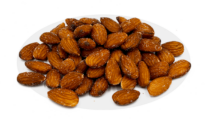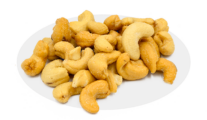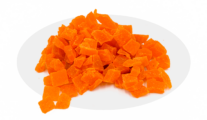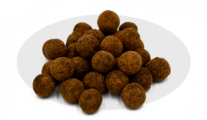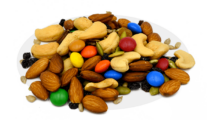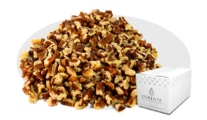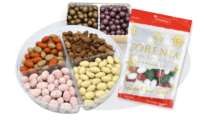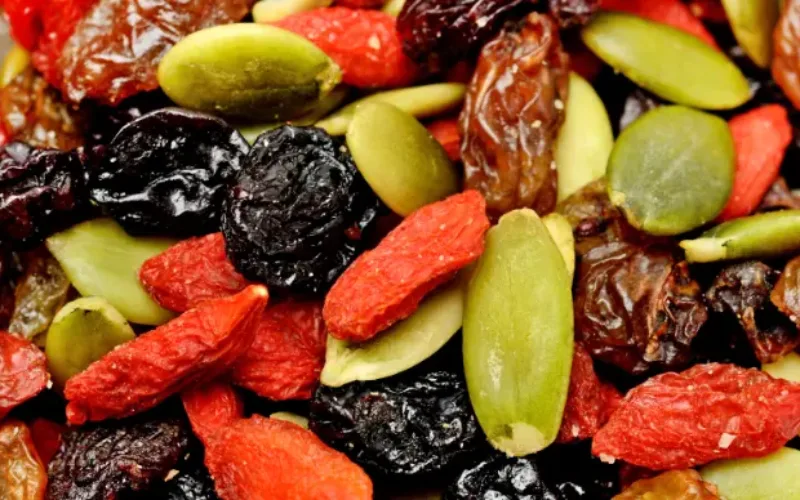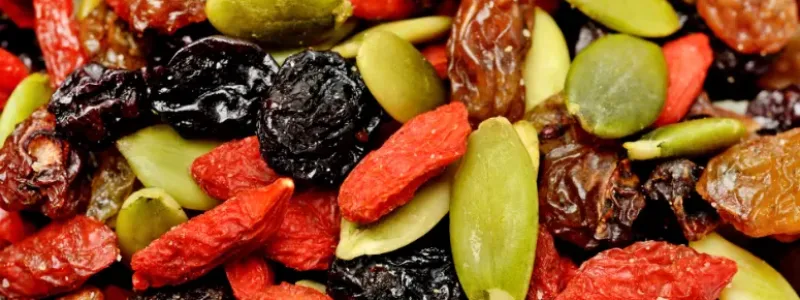Written By Sam Henselijn
Cashews are kidney-shaped seeds that come from the Anacardium occidentale tree. This evergreen tree bears an apple-like fruit and a nut that hangs beneath it. Cashews are not technically nuts but have a long shelf life if properly stored. While salted cashews are high in beneficial elements, the roasting procedure results in a moderate amount of saturated fat and salt. In this article, we’ll go over the 5 health benefits of roasted and salted cashews, how to make them, and which is healthier.
How to make roasted and salted cashews?
These salty roasted cashew nuts are quick and easy to make, and
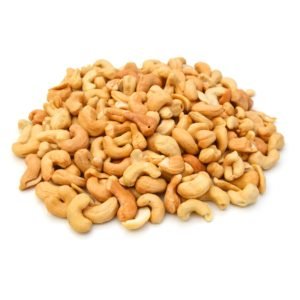
they taste crunchy and wonderful. Roasting cashews will boost their flavor and appeal to both young and old, making incorporating nuts into one’s diet easier. Following the steps outlined here will produce crisp Cashew Nuts that taste identical to store-bought varieties.
Ingredients:
- 1 pound of cashews
- 2 teaspoons oil (your choice)
- 1 teaspoon powdered chili
- turmeric powder (1/2 teaspoon)
- Salt
- Grease the tray with oil.
Instructions:
- Preheat the oven to 200 degrees Celsius for 10-15 minutes.
- In a mixing bowl, pour 2 teaspoons of oil.
- Mix in the salt, chili powder, and turmeric powder thoroughly.
- Add the cashews to the spice paste after measuring them.
- Mix thoroughly.
- Spread the cashews in a single layer on a baking sheet that has been greased.
- Roast for 5-7 minutes in the oven.
- Remove the tray and mix thoroughly to turn the sides.
- Return to the oven for another 5-7 minutes of roasting.
- By now, the cashews should be golden and a little dry. Remove the sheet from the oven; the nuts will not be very crispy at this point; allow them to cool completely before eating.
- Keep the container sealed.
5 Health Benefits of Roasted and Salted Cashews
Cashews are among the most delicious, versatile, and healthy nuts. Cashew nuts are high in healthful fats, proteins, critical vitamins, and minerals and are nutrient-dense, and they can be a healthy supplement to your diet when consumed in moderation.
The potential to prevent cardiovascular disorders
Contrary to popular thinking, cashew nuts are beneficial to our

cardiovascular health. Cashew nuts are high in essential fatty acids, potassium, and antioxidants, which are all beneficial to your heart. It contains phytosterols, phenolic compounds, and oleic acid, which benefit heart health and strengthen blood vessels.
Provides Healthy Fat
A half-cup of roasted cashews contains 32 grams of fat, with saturated fat accounting for less than 20% of the lipid composition. The rest comes from monounsaturated and polyunsaturated fats, which may lower your risk of heart disease and high LDL cholesterol because fat aids in the absorption of fat-soluble nutrients from food; eating cashews with leafy greens or sweet potatoes can help your body absorb more vitamins A, D, K, and E.
Provides Minerals
A half-cup portion of roasted cashews provides half of your daily phosphorus, zinc, and magnesium requirements and one-fourth of your daily iron requirements. It also delivers roughly 6% of your daily calcium and potassium requirements.
A lot of protein
Cashews include a lot of protein, which is good for vegans and vegetarians. According to the Institute of Medicine, protein should account for 10 to 35 percent of your overall caloric diet. Protein should account for 150 to 525 calories per day if you consume 1,500 calories daily. Because each gram of protein contains 4 calories, you’ll need between 38 and 131 grams daily. A half-cup of roasted cashews contains about 10 grams of protein.
Less difficult to digest
Roasted nuts have a stronger flavor and are easier to digest but have a higher salt level. Cashews include oleic and palmitic acids, which human bodies do not manufacture. As a result, eating this nut provides a significant amount of these fibers, which are beneficial to digestion. Roasted nuts are significantly easier to digest than raw nuts, and they fulfill hunger much faster.
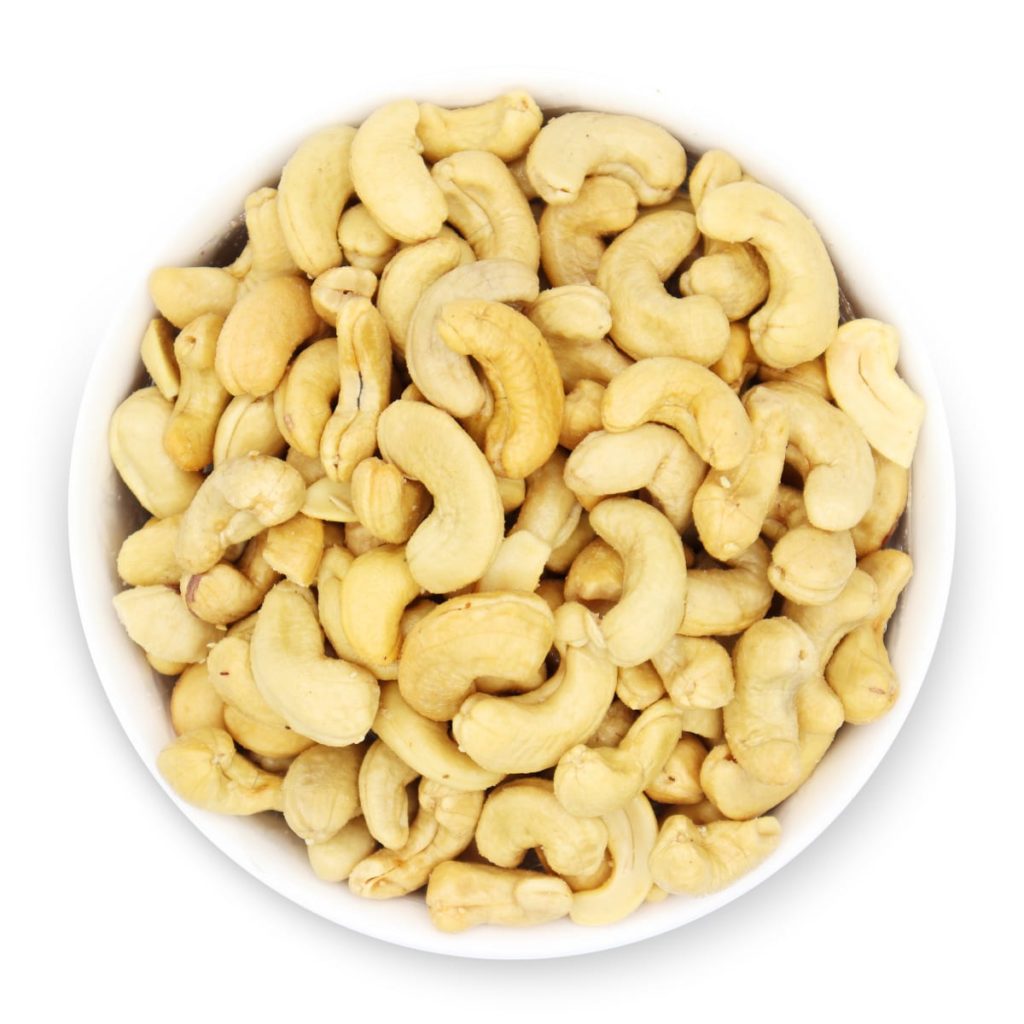
Between raw and roasted cashews, which one is healthier?
Yes and no. Although raw nuts are nutritious, they may contain bacteria that are hazardous to your health. Even if they’ll become unwell, it’s unlikely they’ll become unwell. Roasted nuts may have fewer antioxidants and vitamins.
Both varieties are high in nutrients, and depending on how they are roasted for the second time, both have the potential to be low in sugar. Antioxidants are found in both. Both types of cashews have been found in studies to help with heart health and the production of good cholesterol. Gallstones can be prevented with either type. Both types of cashews include magnesium, which is beneficial to bone health.
Cashews are high in fiber, heart-healthy lipids, and plant protein and are low in sugar. To gain the health benefits, limit yourself to one ounce (28.35 grams) of medium cashews daily. About 18 cashews are in a single serving of cashews. To conclude, it’s critical that you eat cashews to reap the 5 health benefits of roasted and salted cashews, as well as a few others, in order to stay healthy in the long run.
Cashew nuts are delicious and nutritious snacks that many of us enjoy. Did you know that cashews are not actually nuts, but seeds? They are grown on cashew trees, native to Brazil, and take about 2 to 3 months to fully ripe. Once harvested, the seeds are roasted to bring out their rich and buttery flavor that makes them so irresistible.
Are roasted and salted cashews good for you?
Roasted and salted cashews can be a nutritious snack in moderation. They provide healthy fats, protein, and essential nutrients. However, excessive salt intake should be monitored for overall health.
Are salted cashews good for your heart?
Salted cashews can be part of a heart-healthy diet in moderation. While they offer monounsaturated fats, protein, and nutrients beneficial for cardiovascular health, the salt content should be managed to avoid potential adverse effects on blood pressure. Balancing consumption within a healthy diet is key for heart well-being.
What nutrients are in roasted cashew nuts?
Roasted cashews provide essential nutrients like monounsaturated fats, protein, magnesium, phosphorus, copper, and B vitamins. While roasting may alter some vitamin levels, they remain a nutritious snack when consumed in moderation as part of a balanced diet.
Sam Henselijn Author’s Biography – Meet L’Orenta Nuts CEO
Copyright 2024 L’Orenta Nuts
L’Orenta Nuts proudly holds the SQF food safety certification, symbolizing our unwavering dedication to upholding the highest standards of food safety and quality. This certification guarantees that our products undergo rigorous scrutiny, ensuring transparency, traceability, and adherence to global food safety regulations for the utmost consumer confidence.
L’Orenta Nuts has the HACCP (Hazard Analysis and Critical Control Points) certification is a systematic approach to identifying, evaluating, and controlling food safety hazards. It ensures that food products are produced and handled in a manner that minimizes risks and complies with safety standards.
Our GMP (Good Manufacturing Practices) certification ensures that a manufacturing facility adheres to comprehensive quality and safety standards while producing pharmaceuticals, food, and other consumer goods, promoting consistency, quality, and compliance with regulatory requirements.
L’Orenta is an FDA-approved manufacturing facility and has met the rigorous standards set by the U.S. Food and Drug Administration. It demonstrates compliance with regulations, ensuring the production of safe and high-quality food products.


